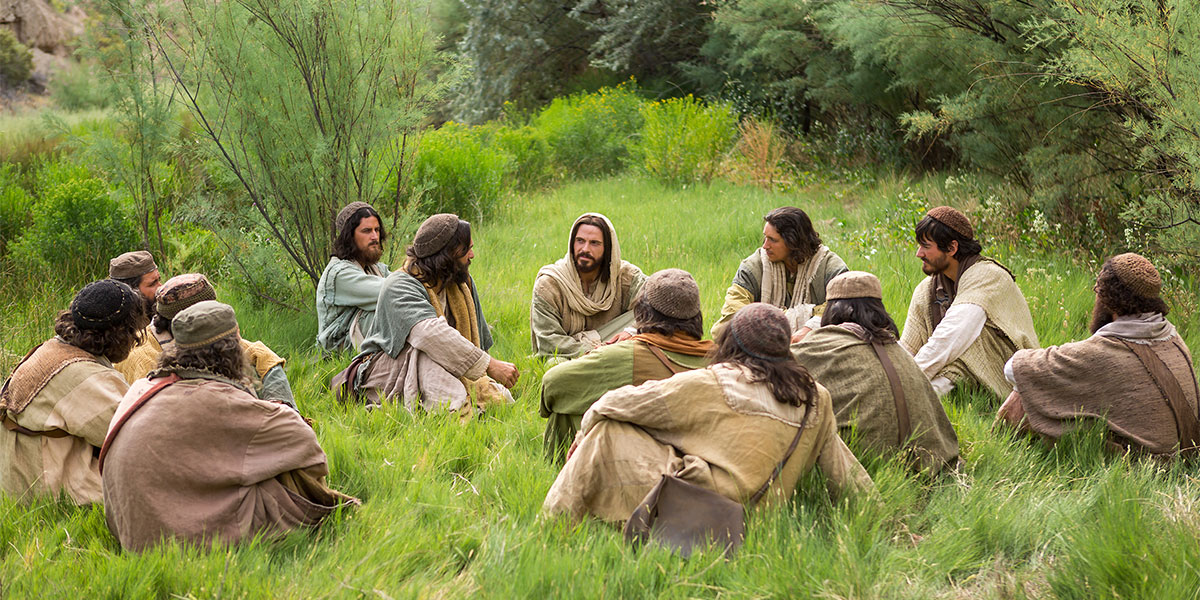
The Know
When asked by a lawyer, “which is the great commandment in the law?” (Matthew 22:36), Christ recited part of the daily Jewish prayer, the Shema: love God with all one’s heart, soul, and mind (v. 37). The Shema is part of Jewish tradition, with its content originating from at least the reign of King Josiah and perhaps even earlier.1 Moses is stated to have originally presented the commandment to Israel.2 God had commanded that they “teach [these words] diligently unto thy children…and talk of them…in thine house, and when thou walkest by the way, and…liest down…and risest up” (Deuteronomy 6:7). Thus, the Shema is recited twice daily, once in the morning and once at night.3
Christ’s response to the publican was not revelatory in the sense that this commandment was new. What was revelatory was his classification of exactly how important it was; “This is the first and great commandment” (Matthew 22:38; Mark 12:30). To further establish its importance, this commandment was also revealed to the Nephites in the Book of Mormon (1 Nephi 17:55)4 and was again revealed in this dispensation by modern prophets (D&C 4:2; D&C 59:5). All of God’s children are to know and understand this first and great commandment: to love God with all thy heart, with all thy soul, and with all thy mind.
The Book of Mormon, like the New Testament, powerfully commands us to “love God with all your might, mind and strength” (Moroni 10:32), and modern revelation can help us know how to fulfill this commandment.
What Does it Mean to Love God?
In the Bible the word love is not necessarily referring to an emotional response. In biblical times, love was often used to describe a kind of devoted loyalty, a loyalty of action, a “covenantal devotion.”5 Some scholars have attributed this great commandment as an early directive for the law of consecration. To be loyal and have “covenantal devotion” is to give of oneself impartially to God. “In short, one who ‘loves the Lord God’ will be ‘faithful and true in all things,’” and keep His commandments.6 Elder Dieter F. Uchtdorf wrote that “love is the measure of our faith, the inspiration for our obedience, and the true altitude of our discipleship.”7 To be a follower of God is to love Him.
Modern prophetic revelation has further taught us that “[we] can speak with tongues, have the gift of prophecy, understand all mysteries, and possess all knowledge…[but] without charity it won’t profit [us] at all.”8 The charge to love God first has been given and as President Ezra Taft Benson explained, “he knew that if we truly love Him we would want to keep all of His other commandments.”9
What Does it Mean to Love God with All Our Mind?
One way we can love God is by “aligning our thoughts and actions with God’s word.”10 Doing so requires faith, humility, and respect. Sometimes it can be hard to commit with our mind “without reservation” or “competing interests.”11 Competing interests could be work, a good book, self-preservation, aspirations, or family.12 Elder Dallin H. Oaks taught that essentially anything can be a competing interest if we place it above our love of God and our loyalty to Him.13 One way to combat competing interests and turn one’s will to serve God is the practice of gratitude: “he loves God with all his mind who … sees God in all things and acknowledges him in all ways.”14
Learning to attentively listen to Him and His voice through His appointed leaders is another way we can give of our mind to God and place Him first amongst our priorities.15 Just as focusing our thoughts and mind to a conversation with a loved one can bring us closer, doing so with the Lord, by listening to His promptings and direction, can likewise bring us closer to Him.
As we listen, we can also learn to care about the things God cares about. We can then deepen our love by applying and consecrating our talents and intelligence to aid His work. Religious scholar and lawyer John W. Welch once said, “we love God with our mind by caring about the problems He cares about [and]… by embracing His work, giving it the best of our planning, research, and problem solving.”16 Elder Oaks stated that as we adhere to and defend the principles of God laid out in the Plan of Salvation, we are in turn demonstrating our love for God.17
An additional way to love God with one’s mind is to study the Savior. Elder Holland beautifully testified, “after generations of prophets had tried to teach the family of man the will and the way of the Father, usually with little success, God in His ultimate effort to have us know Him, sent to earth His Only Begotten and perfect Son, created in His very likeness and image, to live and serve among mortals in the everyday rigors of life.”18 As we study the Savior’s life and learn of Him, we are likewise learning the ways of the Father and further developing our trust in and love of Him.

Painting of woman washing Jesus' feet with tears. Image via Wikimedia Commons.
The Why
In a world that is constantly competing for our attention, we are asked by God to choose Him by giving of our entire mind—our will, intelligence, talents, gratitude, trust, humility, and loyalty—to Him. God loves us perfectly, and our eternal welfare is at the top of His agenda.19 If we are His priority, why shouldn’t He also be ours?
Christ’s entire mission here on earth was to teach us of the love that Heavenly Father has for us, His children. Elder Jeffrey R. Holland taught, “It is the grand truth that in all that Jesus came to say and do, including and especially in His atoning suffering and sacrifice, He was showing us who and what God our Eternal Father is like, how completely devoted He is to His children in every age and nation.”20 He continues on, “In word and in deed Jesus was trying to reveal and make personal to us the true nature of His Father, our Father in Heaven. He did this at least in part because then and now all of us need to know God more fully in order to love Him more deeply and obey Him more completely.”21
Knowing that Christ’s mission was to help us know our Father and His love can help move us to repentance and become more like Him. Not only this but “in the face of any type of inconclusive uncertainty, love gives the benefit of the doubt.”22 When uncertainty hits, we can find shelter in the love we have for our God and trust in His love for us. We can practice saying, as Nephi did to his father, “I will go and do the things which the Lord hath commanded, for I know that the Lord giveth no commandments…save he shall prepare a way” (1 Nephi 3:7). We have been promised that as we put God first “all else will fall into place.”23
As we learn to love God with all our mind, we grow closer to Him and learn of His perfect love for us. Elder Uchtdorf states that God’s love “directs and encourages us to become more pure and holy. It inspires us to walk in righteousness—not out of fear or obligation but out of an earnest desire to become even more like Him because we love Him. By doing so we can become ‘born again.’”24
When we are born again, He will “light up [our] mind, as He did King Lamoni’s. He will cause [our] mind to expand, as Alma promised. He will write His covenants upon [our] mind, as Jeremiah guaranteed… He will bless [our] heart and mind with peace that passes all understanding, as Paul assured.”25 As Jacob testified “lift up your heads and receive the pleasing word of God, and feast upon his love; for ye may, if your minds are firm, forever” (Jacob 3:2).
This KnoWhy was made possible by the generous contributions of Arlo and Jackie Luke.
Further Readings
Jeffrey M. Bradshaw, “What are the most Cited, Recited, and Misunderstood Verses in Deuteronomy?” FairMormon, May 1, 2018, online at fairmormon.org.
Jeffrey R. Holland, “The First Great Commandment,” Ensign, November 2012, online at lds.org.
John W. Welch, “And with All Thy Mind,” BYU Speeches (September 30, 2003) accessed online at speeches.byu.edu.
- 1. See Book of Mormon Central, “How is the Use of Deuteronomy in the Book of Mormon Evidence for its Authenticity?” KnoWhy 428 (April 27, 2018).
- 2. See Jeffrey M. Bradshaw, “What are the most Cited, Recited, and Misunderstood Verses in Deuteronomy?” FairMormon, May 1, 2018, online at fairmormon.org.
- 3. See Bradshaw, “What are the most Cited, Recited, and Misunderstood Verses in Deuteronomy?” online at fairmormon.org.
- 4. For additional scriptures, see Jacob 3:1–2; Mosiah 4:8–12; Mosiah 5:13–15.
- 5. See David E. Bokovoy and John A. Tvedtnes, “Love vs. Hate,” in Testaments: Links between the Book of Mormon and the Hebrew Bible (Toelle, UT: Heritage Press, 2003), 193–195. See also Jeffrey R. Holland, "The First Great Commandment,” Ensign, November 2012, online at lds.org.
- 6. See Bradshaw, “What are the most Cited, Recited, and Misunderstood Verses in Deuteronomy?” online at fairmormon.org.
- 7. See Dieter F. Uchtdorf, “The Love of God,” Ensign, November 2009, online at lds.org.
- 8. See Joseph B. Wirthlin, “The Great Commandment,” Ensign, November 2007, online at lds.org.
- 9. See Ezra Taft Benson, “The Great Commandment—Love the Lord,” LDS General Conference April 1988.
- 10. See Uchtdorf, “The Love of God,” online at lds.org.
- 11. See Bradshaw, “What are the most Cited, Recited, and Misunderstood Verses in Deuteronomy?” online at fairmormon.org.
- 12. For another list of competing interests, see Dallin H. Oaks, “No Other Gods,” Ensign, November 2013, online at lds.org.
- 13. See Oaks, “No Other Gods,” online at lds.org.
- 14. See John W. Welch, “And with All Thy Mind,” BYU Speeches (September 30, 2003), online at speeches.byu.edu.
- 15. See Welch, “And with All Thy Mind,” online at speeches.byu.edu.
- 16. See Welch, “And with All Thy Mind,” online at speeches.byu.edu.
- 17. See Oaks, “No Other Gods,” online at lds.org.
- 18. See Jeffrey R. Holland, “The Grandeur of God,” Ensign, November 2003, online at lds.org.
- 19. See Benson, “The Great Commandment—Love the Lord,” online at lds.org.
- 20. See Holland, “The Grandeur of God,” online at lds.org.
- 21. See Holland, “The Grandeur of God,” online at lds.org.
- 22. See Welch, “And with All Thy Mind,” online at speeches.byu.edu.
- 23. See Uchtdorf, “The Love of God,” online at lds.org.
- 24. See Uchtdorf, “The Love of God,” online at lds.org. For more information on what it means to be “born again,” read Book of Mormon Central, “What Does it Mean to be ‘Born Again’?” KnoWhy 501 (February 7, 2019).
- 25. See Welch, “And with All Thy Mind,” online at speeches.byu.edu.
Continue reading at the original source →



